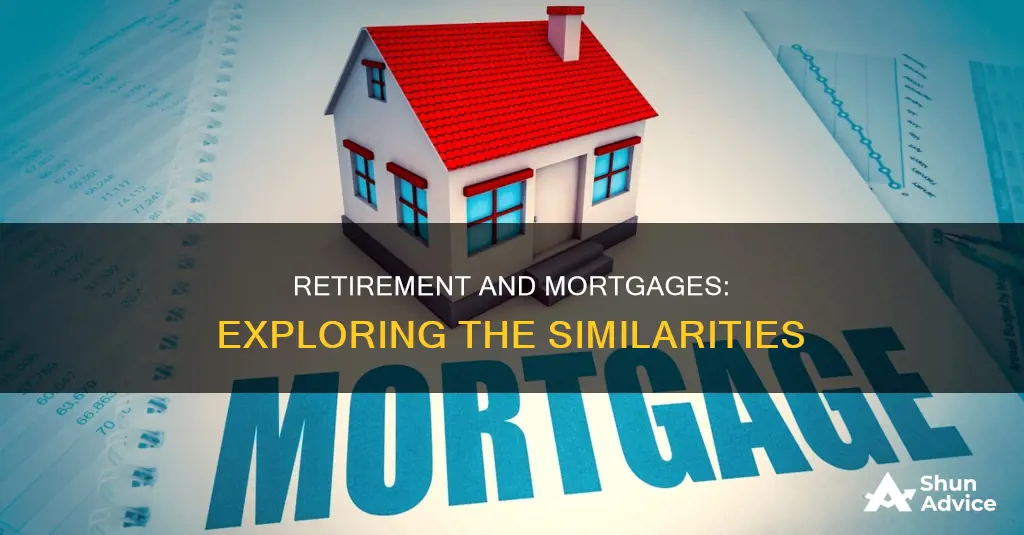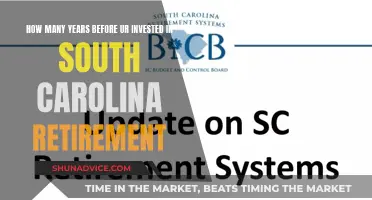
Paying off a mortgage and investing for retirement are both worthy financial goals, but which is best? Well, that depends on your individual financial situation and goals.
If you're trying to reduce your baseline expenses, paying off your mortgage early can help you live on a lot less once that monthly payment disappears. You'll also save on interest payments, which can cost hundreds of thousands of dollars over time. However, if you're not contributing enough to your retirement fund, this should be your top priority. Savings in these accounts grow tax-deferred until withdrawal.
If you're still unsure, consult a financial advisor who can help you assess your finances and run the numbers.
| Characteristics | Values |
|---|---|
| Pros of paying off mortgage | Save on interest |
| Debt-free | |
| Build home equity | |
| More room in your budget | |
| Cons of paying off mortgage | Opportunity cost |
| Illiquid | |
| Loss of tax deductions | |
| Prepayment penalties | |
| Pros of investing | Higher rate of return |
| Liquidity | |
| Employer match | |
| Cons of investing | Risk |
| Not eliminating debt |
What You'll Learn

Paying off mortgage early vs investing: pros and cons
Paying off a mortgage early or investing has its pros and cons and depends on an individual's financial situation, the loan's interest rate, and how close one is to retirement. Here are some of the advantages and disadvantages of both options.
Paying Off Mortgage Early: Pros
- Interest savings: One of the biggest benefits of paying off a loan early is the potential to save thousands of dollars in interest payments.
- Peace of mind: Being debt-free can ease the burden of constant debt. In case of a financial emergency, there is no worry about missing mortgage payments and the risk of losing the home to foreclosure.
- Build equity: Paying down the mortgage faster means building equity in the home, which can help with refinancing for better rates. Home equity can also be leveraged in the form of a home equity loan or line of credit to make improvements or pay off other debts.
Paying Off Mortgage Early: Cons
- Opportunity cost: Money spent on paying down the mortgage faster is money that could be invested in other financial goals, such as retirement savings or emergency funds.
- Wealth is tied up: Property is an illiquid asset, meaning it cannot be quickly or easily converted to cash. In case of a financial emergency or investment opportunity, selling the house and waiting for a buyer could be a lengthy process.
- Loss of tax breaks: Paying off the mortgage early results in losing tax deductions on mortgage interest payments and giving up potential tax savings from maxing out tax-advantaged retirement accounts.
Investing: Pros
- Higher returns: Investing in the stock market or similar instruments has the potential for higher returns compared to the interest saved by paying off the mortgage early.
- Liquid investment: Unlike a home, stocks, bonds, and other market investments can be easily sold and converted to cash if needed.
- Employer match: Investing in a retirement account may come with an employer match, providing additional funds to enjoy compound earnings over time.
Investing: Cons
- Higher risk: Investing in the stock market is riskier than paying off a mortgage. There is potential to gain or lose thousands of dollars, and it requires a longer timeline to weather the ups and downs.
- Increased debt: Choosing to invest while still having mortgage debt means the loan remains, and there is a risk of losing the home if payments cannot be made.
Gamestop Investors: Who's In?
You may want to see also

How your individual financial situation impacts your decision
Deciding whether to pay off your mortgage or invest in your retirement depends on your individual financial situation and goals. Here are some factors to consider:
Your Income and Expenses
If you have a limited income, paying off your mortgage can help reduce your baseline expenses, especially if your monthly mortgage payment is a substantial chunk of your expenses. On the other hand, if you have recently received a raise or an increase in income, investing that extra money in your retirement account or other investments may be a better option.
Your Debt Repayment Status
If you are still in the early years of your mortgage, it is generally smarter to pay down your mortgage as much as possible to avoid paying more in interest over time. However, if you are in or nearing the later years of your mortgage, it may be more beneficial to focus on investing or contributing to your retirement accounts. Additionally, if you have other high-interest debt, such as credit card debt, it is generally a good idea to prioritise paying off that debt before focusing on your mortgage or investments.
Your Retirement Savings
If you are behind on your retirement savings or are not contributing enough to your retirement accounts, such as a 401(k) or IRA, increasing those contributions should be a priority. It is important to balance paying off your mortgage with building a sufficient retirement fund. The earlier you start saving for retirement, the more you can take advantage of compound interest.
Your Cash Reserves and Emergency Funds
Before deciding to pay off your mortgage early, ensure that you have adequate cash reserves and emergency funds. It is recommended to keep a cash reserve of three to six months' worth of living expenses in case of unexpected expenses or financial emergencies. Using all your savings to pay off your mortgage may leave you house-rich but cash-poor, so balancing your cash reserves with mortgage payments is crucial.
Your Risk Tolerance and Investment Opportunities
Consider your risk tolerance and investment opportunities when deciding between paying off your mortgage and investing. Paying off your mortgage early can provide peace of mind and reduce your debt, but it may not offer the same potential for higher returns as investing in the stock market or other investments. On the other hand, investing carries the risk of losing money, and there is no guarantee that you will earn higher returns than simply saving on mortgage interest.
In summary, the decision to pay off your mortgage or invest in your retirement depends on various factors, including your income, expenses, debt repayment status, retirement savings, cash reserves, risk tolerance, and investment opportunities. Consult with a financial advisor to help you assess your financial situation and make a decision that aligns with your goals and priorities.
Dholera: Invest Now or Miss Out?
You may want to see also

The accumulation phase: emergency funds and tax implications
The accumulation phase is a critical period in an individual's financial journey, spanning the duration of their career until retirement. During this phase, the focus is on earning, investing, and building a substantial nest egg for the future. Here are some key considerations regarding emergency funds and tax implications during the accumulation phase:
Emergency Funds
- It is crucial to build an emergency fund to prepare for unexpected expenses. This fund will provide a financial safety net, ensuring you are not forced to dip into your investments prematurely.
- The size of your emergency fund should be sufficient to cover at least three to six months' worth of living expenses. This will provide a cushion in case of job loss, medical emergencies, or other unforeseen events.
- Consider storing your emergency fund in a high-yield savings account or a money market account. These options offer liquidity and typically provide a higher interest rate than traditional savings accounts.
Tax Implications
- Understand the tax implications of your investments during the accumulation phase. Different investment options have varied tax treatments, and making informed choices can enhance your after-tax returns.
- Take advantage of tax-efficient investment strategies. Contribute to tax-advantaged retirement accounts, such as 401(k)s or Individual Retirement Accounts (IRAs), which offer tax benefits like tax-deferred growth or tax-free withdrawals.
- Be mindful of capital gains taxes. When selling investments, you may be subject to capital gains taxes, which can impact your overall returns. Consider holding investments for the long term to qualify for lower capital gains tax rates.
- Consult with a tax professional or financial advisor to ensure you are optimizing your tax strategies during the accumulation phase. They can provide personalized advice based on your specific circumstances.
Dogecoin: Worthy Investment or Just a Meme?
You may want to see also

The distribution phase: generating cash flow
The distribution phase refers to the flow of income from firms to households. This phase is a crucial aspect of the circular flow of income, which involves factor income such as rent, wages, interest, and profits being distributed to households.
During the distribution phase, it is essential to consider the impact of an individual's financial decisions on their cash flow. For instance, the choice between paying off a mortgage and investing in retirement can have significant consequences. While both options have their advantages and disadvantages, the decision should be based on an individual's financial situation and comfort level with risk.
Paying off a mortgage early can provide several benefits, including saving thousands of dollars in interest payments and achieving the freedom of being debt-free. Additionally, paying off a mortgage early can increase financial flexibility by freeing up funds that would have been allocated towards monthly mortgage payments. This extra cash flow can then be directed towards other financial goals, such as investing in retirement or pursuing personal interests.
On the other hand, investing in retirement funds or other financial instruments, such as stocks or bonds, offers the potential for higher returns. By investing in the stock market, individuals can take advantage of compound interest and potentially earn a higher rate of return compared to simply saving money. However, investing also carries a higher risk, and there is no guarantee of favourable returns.
Ultimately, the decision to prioritise paying off a mortgage or investing in retirement depends on various factors, including an individual's risk tolerance, financial goals, and current financial situation. It may even be possible to strike a balance by allocating funds towards both goals simultaneously. Consulting a financial advisor can help individuals make informed decisions that align with their unique circumstances.
Fitness Investment: What's the Priority?
You may want to see also

Key considerations: risk, age, mortgage interest rate, and financial advice
When deciding whether to pay off a mortgage or invest in retirement, there are several key considerations to keep in mind, including risk, age, mortgage interest rate, and financial advice.
Risk
The level of risk you are comfortable with is a crucial factor in deciding whether to pay off your mortgage or invest. Paying off your mortgage early can provide a sense of security and peace of mind, knowing that you own your home outright. It also eliminates the risk of foreclosure if you experience financial difficulties. However, investing in the stock market or other financial instruments can potentially provide higher returns over the long term, although it carries the risk of losses. The stock market has historically risen over time, but it can be volatile, and there is no guarantee of returns.
Age
Your age and proximity to retirement can also influence your decision. If you are younger, it is generally advisable to prioritise retirement savings over paying off your mortgage early, as compound interest will have a more significant impact on your investments. However, as you get closer to retirement, paying off your mortgage may become a higher priority to reduce your monthly expenses and provide financial stability during retirement.
Mortgage Interest Rate
The interest rate on your mortgage is another important consideration. If you have a low mortgage interest rate, investing your money elsewhere may provide higher returns. On the other hand, if you have a high-interest mortgage, paying it off early can save you a significant amount of money in the long run. Additionally, paying off your mortgage early can reduce your tax deductions, as mortgage interest payments are often tax-deductible.
Financial Advice
Consulting a financial advisor is always recommended when making significant financial decisions. A professional can help you analyse your personal situation, risk tolerance, investment options, and tax implications. They can provide tailored advice based on your financial goals and comfort level with risk.
Navigating the Legal Landscape: Paying Finder's Fees for Investment Referrals
You may want to see also
Frequently asked questions
Paying off your mortgage early can save you thousands of dollars in interest and give you peace of mind from being debt-free. It can also help you build equity in your home, which can be leveraged for other financial goals, such as a home equity loan or line of credit.
Yes, paying off your mortgage early may result in opportunity costs, as your money is now tied up in an illiquid asset. Additionally, you may lose out on tax deductions for mortgage interest and retirement account contributions.
Investing in retirement can provide higher returns, especially if your employer matches your contributions. Investments are also more liquid, meaning you can easily access your money if needed.
Investing is riskier, and you will still have mortgage debt. There is also the potential to lose money if the market underperforms.
Yes, you can make small additional contributions towards paying down your mortgage while also investing in your retirement. This can be a good compromise, especially if you are in the early years of your mortgage when most of your payments are going towards interest.







